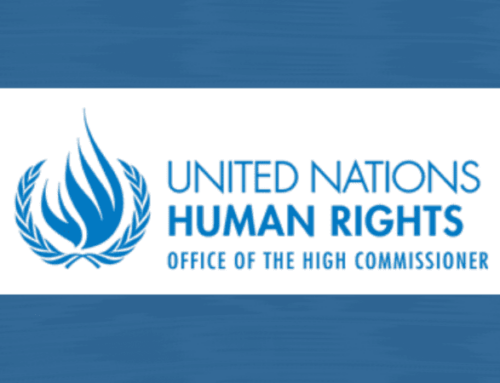Monitoring of the case of Andrey Tatarintsev (hearing on 11.25.2020)

On October 25, 2020, an open hearing was held in the Kuibyshevsky District Court of the Zaporozhye Region in the case of businessman A. Tatarintsev, who is accused of committing crimes under Part 1 of Art. 258-3, part 5 of Art. 27, part 2 of Art. 28, part 2 of Art. 437, part 1 of Art. 438 of the Criminal Code of Ukraine (financing a terrorist organization, complicity in the conduct of an aggressive war, cruel treatment of prisoners of war and the civilian population).
According to the lawyer of A. Tatarintsev, Vladimir Lyapin, in 2014-2015 the accused was trading gasoline at a tank farm located on the territory of certain districts of Donetsk and Lugansk regions, and after the obligation to the armed persons who appeared to be the military of the unrecognized republics of the DPR / LPR, he was forced to transfer fuel to the ambulance station and other facilities.
A.Tatarintsev suffers from type 2 diabetes. Objective data obtained by the ISHR in the course of monitoring this proceeding allow us to conclude that during almost 3.5 years of detention, the accused did not receive medical assistance and dietary food prescribed for his illness.
Hearing progress:
At the beginning of the hearing, it was reported that the prosecutor of the Office of the Prosecutor General A. Kazakevich could not be present at the hearings in the case of A. Tatarintsev, since quarantine was declared in the country, and Zaporozhye was in the “red” zone, which did not allow him to move from Kiev to Zaporozhye on a public transportation. A new prosecutor was appointed in the case, from the Kuibyshevsky interdistrict prosecutor’s office – V. Vinnitsky. Since he finds out about his participation in the proceedings only the day before the hearing and, accordingly, could not prepare, the prosecutor filed a motion to postpone the hearing. Taking into account that the next hearing agreed by the parties was scheduled for December 23, 2020, judge V. Malevanny announced that he was postponing the court to that date. However, lawyer V. Kravtsov recalled that A. Tatarintsev’s term of measure of restraint expires on December 5, so the court must meet before the specified time. Judge V. Malevanny replied that the issue of extending the measure of restraint can be considered right now, to which he received a protest from the defense – procedural actions cannot be carried out without the participation of the prosecutor, and the prosecutor has not yet studied the case and, accordingly, cannot prove either the existence of risks or the validity of the charge, which is necessarily required by the provisions of the Criminal Procedure Code of Ukraine. After a short meeting, the panel of judges postponed the hearing to December 02, 2020.
Experts of the International Society for Human Rights believe that the postponement of hearings for various reasons, incl. due to the unpreparedness of the prosecutor, may lead to a violation of paragraph 3 of Art. 5 of the Convention for the Protection of Human Rights and Fundamental Freedoms, i.e., the right to trial within a reasonable time (“Buryaga v. Ukraine”, para. 62), especially in light of the defendant’s illness.
According to the lawyer V. Lyapin, it became known that a complaint was filed with the ECtHR regarding the violation of A. Tatarintsev’s rights. The defense side claims that the failure to provide medical care to a person suffering from diabetes for several years can lead to irreparable and at the same time significant harm to the life and health of the prisoner, disability and even death.
According to V. Lyapin, all the necessary evidence regarding the pre-trial detention center has already been obtained. Thus, to the request of A. Tatarintsev to the new management of the medical unit of the pre-trial detention center #11, represented by D. Balashov, an official response was received that the drugs prescribed by the endocrinologist were not available at the disposal of the medical unit of the pre-trial detention center. The defense recalled that in a number of decisions of the Kuibyshevsky District Court on the extension of A. Tatarintsev’s measure of restraint in the form of detention in custody, the court referred to the certificate of the head of the branch of the State Institution “Health Protection Center of the State Penitentiary Service of Ukraine“, in which it is indicated that the medical unit of the pre-trial detention center #11 is equipped with all prescribed drugs in the form of domestic analogues. Since the documents contradict each other, the defense would like to make sure that A. Tatarintsev received treatment and dietary nutrition.
To obtain information on the provision of dietary food to A. Tatarintsev, the court interrogated the convoy. The head of the convoy once again confirmed that he had not received any medicines for A. Tatarintsev, and whether the ration given to him was dietary food, he did not know. Then V. Lyapin asked the court to allow the accused to be examined by endocrinologist S. Tovstyga, who was in the courtroom, in order to assess the state of health of A. Tatarintsev, who had not received the medicine, and to determine whether the ration transferred from the pre-trial detention center was dietary food for diabetics. However, the court did not allow this to be done, telling the lawyer that he “confuses the courtroom with a hospital”. Despite the lawyer’s statement that he had one more motion, the collegium finished the session and left the hall. The ISHR experts express their concern about the violation of the principle of equality in the case of A. Tatarintsev. The principle of equality of arms is only one feature of the broader concept of a fair trial, which also includes the fundamental right to adversarial criminal proceedings (“Barbera, Messege and Jabardo v. Spain”, paras. 33-34).
An ambulance was called to the court again. A. Tatarintsev’s blood sugar measurement gave (on the paramedic’s device) an indicator of 15.6 (3 times higher than the norm) and (on the device of the endocrinologist Tovstyga – 18.8 (3.5 times higher than the norm), with such indicators, the patient needs hospitalization, an IV drip and other medical measures. Both the paramedic of the ambulance and the endocrinologist confirmed to the court’s questions that the blood pressure is 165/100, tachycardia and arrhythmia are present.
A.Tatarintsev himself reported confirmed cases of coronavirus in jail among the administration, many prisoners are sick, some have lost their sense of smell, but the administration does not conduct a coronavirus test and does not isolate those infected from the rest of the prisoners.
The next day, lawyer V. Kravtsov got coronavirus tests for his clients in the pre-trial detention center #11. Several of them had positive results. One of the infected is kept in a cell together with A. Tatarintsev, a diabetic, who is at risk. All data will be sent to the ECtHR for a final decision in accordance with Rule 39 of the Regulation.
The International Society for Human Rights draws attention to the fact that, according to the ECtHR judgment in the “Kalashnikov v. Russia” case, para. 95, the state must ensure that a person is held in custody in conditions that respect human dignity, so that the nature and method of execution of the measure of restraint did not cause the person suffering or hardship, the intensity of which exceeds the inevitable level of suffering inherent in detention. In the judgment of the ECtHR in the case “Salakhov and Islyamova v. Ukraine”, para. 129 “… The European Court emphasizes that Art. 3 of the Convention imposes a duty on the State to ensure, taking into account the practical requirements of imprisonment, that the health and well-being of the prisoner is adequately guaranteed, including by providing him with the necessary medical assistance.” In addition, the ECtHR has repeatedly indicated that it is the responsibility of the state to provide the necessary medical assistance to persons in places of detention (“Wuhan v. Ukraine”, para. 72).
In addition, the ECtHR argues that the failure to provide adequate and timely medical care in prisons is tantamount to inhuman and degrading behavior (“Garumov v. Ukraine”, para. 46; “Hummatov v. Azerbaijan”, paras. 112-122; “Wuhan v. Ukraine”, paras. 77 – 83; “Petukhov v. Ukraine”, paras. 91 – 98; “Sergei Antonov v. Ukraine”, paras. 70 – 75).
The court’s refusal to conduct a medical examination of the accused complaining about the state of health may be regarded as a violation of Art. 3 of the European Convention for the Protection of Human Rights and Fundamental Freedoms, which determines that “no one should be subjected to torture or inhuman or degrading treatment or punishment” (“Beketov v. Ukraine”, para. 76).
Experts from the International Society for Human Rights will continue to monitor this proceeding.








Leave A Comment